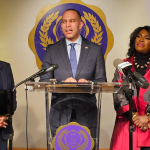SPEAKIN’ OUT NEWS
A coalition of professors, students, and the Alabama State Conference of the NAACP filed a federal lawsuit today, contesting a recently enacted Alabama law they argue stifles education and diversity initiatives in public institutions. The lawsuit, announced by the ACLU of Alabama, challenges Senate Bill 129, which bans diversity, equity, and inclusion (DEI) programs in public colleges, school boards, and state agencies, and restricts teaching so-called “divisive concepts.”
The plaintiffs, including three University of Alabama professors and three University of Alabama at Birmingham students, claim the law violates their First and Fourteenth Amendment rights. According to the lawsuit, the professors have altered or canceled curriculum to avoid penalties under the law, while the students report reduced educational opportunities and the loss of on-campus resources for organizations affected by the DEI ban.
The lawsuit alleges SB 129 intentionally discriminates against Black students, who have historically benefited from DEI programs designed to address systemic racial inequality. “SB 129 seeks to suppress discussions of racial discrimination and dismantle support systems that help Black students overcome barriers to success,” the filing states.
Since the law’s October 1 enactment, DEI offices have closed at universities across the state, including the University of Alabama and Auburn University. LGBTQ+ and minority student organizations have also faced funding cuts and restrictions on campus activities.
Governor Kay Ivey, who signed SB 129 into law last year, defended the measure, stating, “Alabama values diversity, but taxpayer dollars should not fund DEI programs pushing political agendas at odds with the beliefs of most Alabamians.”
The law is part of a broader national trend in Republican-led states targeting DEI initiatives. Similar legislation has emerged in states like Florida, Texas, and Missouri, where universities have closed diversity offices and scaled back support for marginalized students. Critics argue these efforts are erasing progress in addressing inequality, while proponents claim they combat bias and restore neutrality in public institutions.
The lawsuit seeks to overturn SB 129, contending it undermines academic freedom and denies students a comprehensive education. As legal challenges unfold, the law’s impact on Alabama’s educational landscape and its implications for diversity programs nationwide remain under scrutiny.











